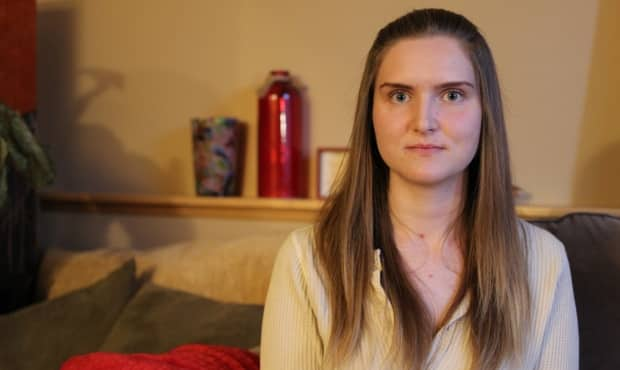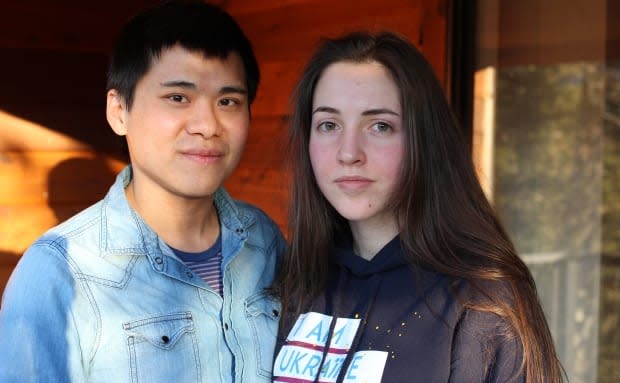Ukrainian evacuees are building new lives in the Bow Valley

Serhii Malamura woke up on Feb. 24, 2022, to the sound of explosions. Russia's invasion of Ukraine had begun.
Not knowing when — or where — another blast might arrive, the family went to their basement, where they ended up staying about a month.
"The biggest issue was not having enough food," said Malamura, who spoke to CBC News with the help of a translator. He said they managed to survive off a store of potatoes and preserves, with little to do but sit and wait in fear for the next strike.
"It got really hard," he said, especially for his young children, including a then-two-month-old baby.
Amid the fear and uncertainty of the war, Malamura said his family saw their first glimmer of hope when they learned about the Canada-Ukraine Authorization for Emergency Travel (CUAET) program, a temporary resettlement initiative for Ukrainians fleeing the war with Russia.
It took nearly an entire year for the family to get visas and passports (a complicated process given the closure of embassies in Ukraine) and to make the long journey from Ukraine to Poland, to Vienna, to Canada with the help of a not-for-profit.
They arrived just a few weeks ago in Canmore, where they now live with a local host family.
"We're very grateful," said Malamura, who is from Skybyn, Ukraine, about 30 kilometres from the centre of Kyiv.
"[We] were never able to imagine they'd be able to wind up in such a wonderful place like Canmore."
Community growing
Malamura's family is part of a small but growing community of newly arrived Ukrainians living in Canmore, Banff, Lake Louise and Kananaskis.
There are now about 160 living there, according to Settlement Services in the Bow Valley. Some have chosen the region because of a connection to a local friend or family member; others have been attracted by a job in the hospitality sector.
It's a transition that can be full of highs and lows. There is relief at being in Canada mixed with fear and worry for loved ones back home; wonder at the region's natural beauty, combined with the challenges of adjusting to a new culture (not to mention, the region's ongoing housing and affordability crisis.)

"Everyone who I've been talking to, they're just saying how welcoming the Canmore community is and how beautiful the surroundings are," said Liza Kanischeva, a local volunteer who organizes fundraisers and events for the local Ukrainian community.
At the same time, she said, "everyone is struggling in their own way and fighting their own war."
'We were lucky'

Elizabeth Mokra describes the early part of 2022 as a "perfect time" in her life. She was working and attending university in Kyiv; travelling, volunteering and going to parties during her time off.
"We didn't really worry about our future," she said.
By February 2022, it was clear that tensions were escalating.
Mokra, whose family had to leave Donetsk in 2014 when Russia annexed Crimea, didn't want to believe it could happen again. Still, her husband convinced her to take a trip to the western part of Ukraine — just in case.
Like Malamura and his family, they awoke Feb. 22 to the sound of explosions. They soon joined the groups of people crossing the border into Poland.
"We were just [standing] on the road in Poland, we didn't know where to go next," said Mokra.
With the help of friendly strangers in Poland, they first traveled to Germany, then on to Canada after hearing about CUAET program. Mokra's husband, Charles Hung, had previously worked as a tour guide and travel agent and was familiar with Banff as a tourist town.
After briefly living with a host family in Calgary, they arrived in town last spring.
While relieved to be here, they admit the first few months were a challenge. Both Mokra and Hung had studied English but found speaking it in day-to-day conversation was more difficult.
There are also quirks about Canada that required adjustment, such as the tax system and the unusual amount of scam calls.
"It's still quite challenging, but it's much better than beginning," she said.
Thinking of home
Both Malamura and Mokra note that being in Canada can be bittersweet, as their thoughts remain with their home country.
Mokra messages back and forth with the mother of a friend who was killed after joining the Ukrainian army. Malamura still gets air raid notifications on his phone.
"Our scars remain," he said in a statement written with the help of a translator. "Our middle boy saw a low flying plane the other day, and thinking it was a rocket, he was preparing to hide."
For now, they're making plans for the future. Malamura's children are enrolled in school; he's taken a job and is starting English lessons.
Mokra has a job she enjoys at a crystal shop in Banff. She hopes to apply for permanent residency and study law, ultimately working to help newcomers like her.
"We are trying really hard. We are trying to make our life better and to blend in and feel like [we've built] a new home here," she said.

